- Home
- Sarah MacLean
Wicked and the Wallflower Page 13
Wicked and the Wallflower Read online
Page 13
The gold dress would send a message—all without Felicity Faircloth knowing—that Devil had been there first. That he was ahead of his brother in this game. That he would win.
Marwick watched her for a long moment, and all Devil wanted to do was steal her away.
He was saved from the instinct by a different man, the one who had touched her wrist earlier. He indicated the orchestra and extended his hand. An invitation to dance. Felicity put her hand in his and he led her onto the dance floor, away from Ewan.
Away from Devil.
Whit grunted. “I’m leaving.”
“Go, then,” he said. “I’m staying.”
“With her?”
Yes. “With them.”
After a long silence, Whit said, quietly, “Good chase, then,” and left Devil in the darkness, watching her as she was passed from partner to partner, spinning across the ballroom again and again. He watched as she smiled up at one escort after another, silently cataloguing each one’s missteps—a hand too low on her waist. A too lingering glance at her bosom. A whisper too close to her ear.
As he watched the performance, Devil began to ache with it, with the keen distaste for the men who were able to touch her, to hold her, to dance with her. And he quietly imagined punishing them the way he’d punished Reggie the night before. Banishing them from her presence. For a moment, he imagined what would happen if he could do that—if he could banish one after another after another, until the only man left was him.
A man unworthy of her, as he fully intended to use her to ruin another before leaving her in ruin herself.
But there had been a time, decades earlier, when it might have been Devil inside that room, dressed in finery, watching his betrothed, clad in finely spun gold, happily pulling her into his arms and dancing her through the room.
There had been a time when he might have been the duke. When he might have been able to give Felicity Faircloth the life of which she dreamed.
And for a fleeting moment, he wondered what he might have done to open that door if he’d known she was on the other side.
Anything.
Blessedly, the dancing stopped, and she was alone at the edge of the ballroom, behind a potted fern, stepping through a door left open to the night beyond.
The night, where he reigned.
Chapter Eleven
Felicity had spent much of her twenty-seven years at the center of the ton. She’d been born with immense privilege, the daughter of a rich marquess, sister of an even richer earl, cousin to dukes and viscounts.
She’d been smiled upon by society, and, when she came out, it was to be immediately welcomed by the most powerful children of the aristocracy. Women invited her to the gossip of ladies’ salons, men scraped and bowed and battled their way to refreshment tables to fetch glasses of champagne.
She’d never been belle of the ball, but she’d been belle of the ball adjacent, which meant dancing every dance and flirting with gentlemen and summoning the vaguest of pity for those who stood at the edge of the ballroom.
And she’d never quite noticed what it was to be at the center of the ballroom, because she’d always been there.
That is, until she was banished from it. Then, like an opium eater, all she’d wanted was to return.
Devil had promised her that return and, somehow, he’d delivered it. As though he were magic, after all. As though he really could make the impossible, possible.
She’d arrived that evening in the gown he’d sent, which looked as though it were made of spun gold, and she’d been instantly surrounded by smiling, welcoming faces, each more complimentary than the last, each wishing to speak a kindness to her. To make her laugh. And all because her lie had somehow not been revealed. In their minds, she was the next Duchess of Marwick, infinitely more valuable that night than she had been a week earlier—and they welcomed her with open arms.
But it was not as sweet a homecoming as Felicity had imagined.
Because she was no different than she had been a week earlier.
And now, halfway through the ball, having danced a half-dozen dances and flirted not at all effortlessly, having had trouble knowing when to laugh and when a laugh might be taken as a great insult, and having been terrified that she might say or do something wrong and ruin her one chance at saving her family, Felicity Faircloth knew the truth.
Being a darling of the ton was a fireplace filled with wood left out in the rain—hopeful and worthless. All of London minced and simpered after her because the duke had not denied their engagement and did not seem interested in doing so tonight. London seemed to have rediscovered Felicity Faircloth, plain, spinster, wallflower, and renamed her fascinating, affianced, bon vivant.
Which she wasn’t, of course. She was no different today than she had been a month ago, except today she was to marry a duke. Supposedly.
And her reentry into society because of that—it wasn’t nearly as rewarding as she would have expected.
Escaping the crush, Felicity tucked herself behind a potted fern beyond a blessedly open door. All she wished to do was to step over the threshold and flee into the darkness, to hide until it was time to leave.
But she couldn’t do that, as she still had three dances left on her dance card.
Three dances, and none with the Duke of Marwick, who was supposedly her fiancé. At least, he hadn’t denied the engagement, and he’d sent notice to her father that he would soon come to discuss the details of an impending marriage, which had sent her mother into fits of pleasure and set Arthur to smiling once more. Even Felicity’s father had grunted his pleasure at the turn of events, and the Marquess of Bumble rarely had time for domestic matters, let alone time for articulating his pleasure with them.
No one seemed concerned that the duke had not thought it necessary to darken Felicity’s doorstep at any point.
“Surely, he’ll turn up eventually,” her mother had replied when Felicity had pointed out the odd progression of events and her alleged fiancé’s invisibility. “Perhaps he’s simply busy.”
Felicity rather thought that a man who had time to send correspondence relating to an engagement would find the time to set the thing in motion, but that seemed beside the point.
All that, and Devil had promised her that the dress she wore would lure the duke, would put him in her path and help to win him, but so far, there had been no inkling of such a triumph. She wasn’t even certain the duke was in attendance. Was it possible he’d left London altogether? And if so, what was Felicity to do—continue to brazen it through and lie to all the world?
At some point, the Duke of Marwick would have to realize that they were not, in fact, engaged. And no frock—sent by the Devil or otherwise—was magic enough to protect her from the truth once she had to stare down the Duke of Marwick himself.
Not even this frock, which seemed more magical than any she’d ever imagined.
It was perfect.
How he’d done it was a mystery—but he’d promised her a perfectly fitted dress, and one had arrived that morning, as though crafted by magical beings. It had been crafted, in fact, by Madame Hebert, London’s most renowned modiste, despite Felicity not having been to the dressmaker in months—the product, she now realized, of her family’s penny pinching as much as her own disinterest in frocks now that she wasn’t welcome at the center of this world.
It seemed, however, that Hebert knew what kind of gown would be of interest. And it was a most definitely interesting one, Felicity had to admit. Even if Arthur’s brows hadn’t shot up when she’d appeared in it, Felicity had known the moment she’d opened the great white box embossed with a gold H that it was going to be the most beautiful gown she’d ever worn.
It hadn’t been a dress alone, however. There had been shoes and stockings and gloves and undergarments—she blushed at the memory of them, each piece edged with ribbons in a pink so vibrant it seemed scandalous.
I like pink, she’d told him earlier in the week.
It fe
lt sinful to wear those underthings, silk and satin and stunning, knowing they came from him. Nearly as sinful as wearing the dress itself, because she hadn’t been able to stop herself from thinking of wearing it for the man who had sent it, rather than for all the men who had seen it tonight.
She’d even left the door to her balcony open all day, thinking perhaps he would sneak in once more. That he might wish to see her in it. That he might wish to see that she looked something like pretty in it.
But he hadn’t come.
He’d kissed her in the darkness, giving her a taste of wickedness and sin, tempting her with its power, promised to see her in three nights’ time, and then . . . deserted her.
It wasn’t as though a man who lived in Covent Garden and carried a weapon in his walking stick had been invited to a ball hosted by one of the longest standing titles in Britain. Even if Felicity wished it so.
“He didn’t come, the bastard,” she whispered to herself and the inky blackness beyond.
“Such language, Felicity Faircloth.”
Her heart began to pound as she spun around to face him. “Are you an actual devil? Have I summoned you with my thoughts?”
His lips twisted in a wry smile. “Have you been thinking of me?”
Her mouth dropped open. She’d had too much champagne if she was admitting that. “No.”
The smile became a wolfish grin and he backed away into the shadows. “Liar. I heard you, my talkative wallflower. I heard you curse my not coming. Was I expected in your rooms?”
She blushed, grateful for the darkness. “Of course not. I keep my doors locked, now.”
“It’s a shame I don’t know a lockpick, then.” She coughed, and he laughed, low and dark and delicious. “Come into the darkness, Felicity, lest you be caught cavorting with the enemy.”
Her brows knit together but she followed him nonetheless. “Are you the enemy?”
He rounded the corner, where the light from the ballroom gave way to dark. “Only to everyone in Mayfair.”
She drew closer to the shadow of him, wishing she could see his face. “Why is that?”
“I am all they fear,” he said, low and dark. “Everyone has a sin, and my trick is knowing it. I can read them on people.”
“What is mine?” she whispered, her heart pounding, at once eager to hear his answer and terrified of it.
He shook his head. “Tonight, you are too aflame for sin, Felicity Faircloth. You’ve burned it all away.” She smiled, the words making her breathless. “And so, tell me. Have you reentered the aristocratic fold?”
She spread her hands wide. “Wallflower no more.”
“Pity,” he said.
“No one wants to be a wallflower,” she said.
“I’ve always thought the wallflowers the best in the hothouse,” he replied. “But tell me, my potted orchid, which moths have you lured?”
She wrinkled her nose. “You are mixing metaphors.”
“Careful, your wallflower past is showing. No darling of the ton would ever dream of criticizing a man’s grammar.”
“No darling of the ton would ever dream of clandestinely meeting a man like you.”
His lips pressed together in a firm line, and for a moment, she felt a pang of guilt at the words before he leaned back against the side of the house. “Tell me about the incident in the bedchamber.”
She went still. It shouldn’t be a surprise that he knew about it—everyone knew about it. But he didn’t know about the other scandals in her life, so why would he know about this one?
Why did he have to know about this one? She swallowed. “Which incident?”
“The one that made you a woman of questionable eligibility.”
She winced at the description. “How did you know about that?”
“You will find, my lady, that there are few things about which I do not know.”
She sighed. “There’s nothing to be said. There was a ball. And I found myself in a man’s bedchamber by accident.”
“By accident.”
“Mostly,” she hedged.
He watched her for a long moment, and then asked, “Did he touch you?”
The question surprised her. “No—he—in fact, he was quite outraged to discover me there, which I suppose I should be grateful for, as if he hadn’t been I might have—” She stopped and tried again, “I’m not the world’s greatest beauty to begin with, and to add to it—” She stopped.
“What?”
“Nothing.”
“I don’t think that’s true.”
She sighed again. “I was crying.”
A beat. “In a stranger’s bedchamber.”
“Might we be finished with this conversation?”
“No. Tell me why you were crying.” There was an edge to his voice that she hadn’t noticed before.
“I’d rather not.”
“Need I remind you that you owe me for that pretty frock, Felicity Faircloth?”
“I was under the impression that the frock was part and parcel with our original arrangement.”
“Not if you’re not going to tell me why you were crying, it isn’t.”
He was an irritating man. “I’d rather not tell you, because it’s silly.”
“I don’t mind silly.”
She couldn’t help the laughter that came at the words. “Excuse me, but you seem to be the kind of person who minds silly exceedingly.”
“Tell me.”
“I was—part of a group. I had friends.”
“The vipers from the other night?”
She shrugged. “I thought they were my friends.”
“They weren’t.”
“Yes, well, you weren’t there to tell me that, so . . .” She paused. “At any rate, that was why I was . . . in a state. We’d been inseparable. And then . . .” She paused, resisting the knot of emotion that came whenever she thought of that time, when she’d been a society darling, and the world had seemed to bend to her will. “Like that . . . we were not. They still sparkled and glittered and loved each other. But they did not love me. And I did not know why.”
He watched her for a long time. “Friendship is not always what we think. If we are not careful, it often becomes what others desire.”
She looked to him. “You don’t seem the kind of man who—loses friends.”
He raised a brow. “I think you mean that I don’t seem the kind of man who has them to begin with.”
“Do you?”
“I have a brother. And a sister.”
“I should like to be your friend.” The confession shocked them both, and she wished she could take it back.
Even more so when he replied, “Felicity Faircloth, I’m no kind of friend for you.” He wasn’t wrong, but it smarted nonetheless. “Shall I tell you why your so-called friends left you?”
“How would you know?”
“Because I’m a man of the world and I know how it turns.”
She believed him. “Why?”
“They deserted you because you were no longer useful. You stopped laughing at their idiot jests. Or stopped simpering after their faded frocks. Or stopped encouraging the cruelty they directed at everyone else. Whatever it was, you did something to make them realize you were no longer interested in licking their boots. And there is nothing like the loss of a sycophant to anger gasbags like those four.” She hated the reasoning, even as she knew it was correct. Even as he added, “Every man and woman inside that room is a parasite, Faulk, Natasha Corkwood, and Lord and Lady Hagin included. And you are best rid of them, my pretty flame.”
At the words, she looked back into the ballroom, watching scores of revelers chatter and gossip and dance and laugh. They were her people, were they not? That was her world, wasn’t it? And even if she’d had the same thought earlier, though not in so many words, she should defend her world to this man—this outsider, she supposed. “Not all aristocrats are parasitic.”
“No?”
“I am not.”
; He came off the wall then, rising to his full height, and she tilted her face up to meet his gaze. “No. You’re just so very desperate to be part of it again that you’re willing to make a deal with the Devil to do it.”
What if I changed my mind?
She resisted the whisper of a thought. “I need to save my family,” she whispered, her cheeks blazing. I don’t have a choice.
“Ah, yes. Familial loyalty. That is admirable, but it seems to me that they could have told you their situation before throwing you to the marriage-seeking wolves.”
She hated him a little then. Hated him for speaking the words that she barely dared think. “I shan’t be a bad wife.”
“I never said you would be.”
“I will keep his house and provide him heirs.”
His gaze found hers instantly, hot and focused in the darkness. “Is that the dream, then? Mothering the next Duke of Marwick?”
Felicity considered the question for a long moment. “I’ve never had aspirations to ducal motherhood, but I should like children, yes. I think I would make a fine mother.”
“You would.” He looked away. Cleared his throat. “But that’s not the only dream, is it?”
She hesitated, the soft question swirling around them. The secrets it seemed to understand. The desire to be accepted by these people. To take a place among them again. “I don’t wish to be alone any longer.”
He nodded. “What else.”
“I wish to be wanted.” The truth hurt as it emerged, leaving an ache in her throat.
He nodded. “That’s why you lied at the start.”
“And why I agreed to our deal,” she said, softly. “I want it all. I told you. So much more than I can have.”
“You are worth all of them combined,” he said. “But hearing it from me is not enough, is it?”
It was more than he knew, it seemed, from the warmth that spread through her at the words. And yet, it wasn’t enough. “You don’t know what it was like. What it is like.”
He watched her for a long moment. “As a matter of fact, my lady, I know precisely what it is like to lose people you think you can rely upon. To be betrayed by them.”

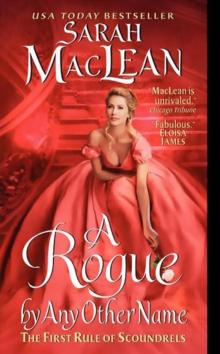 A Rogue by Any Other Name
A Rogue by Any Other Name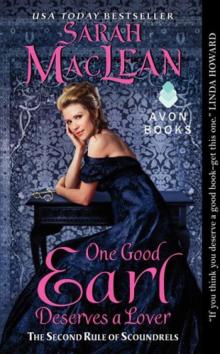 One Good Earl Deserves a Lover
One Good Earl Deserves a Lover Ten Ways to Be Adored When Landing a Lord
Ten Ways to Be Adored When Landing a Lord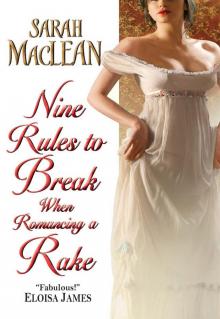 Nine Rules to Break When Romancing a Rake
Nine Rules to Break When Romancing a Rake A Duke Worth Falling For
A Duke Worth Falling For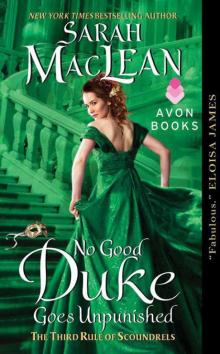 No Good Duke Goes Unpunished
No Good Duke Goes Unpunished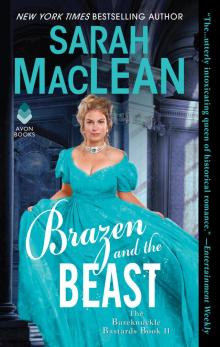 Brazen and the Beast
Brazen and the Beast Never Judge a Lady by Her Cover
Never Judge a Lady by Her Cover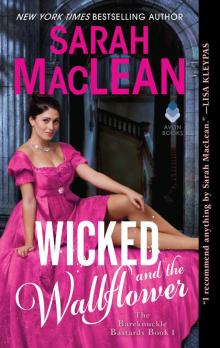 Wicked and the Wallflower
Wicked and the Wallflower The Rogue Not Taken
The Rogue Not Taken Bombshell
Bombshell A Scot in the Dark
A Scot in the Dark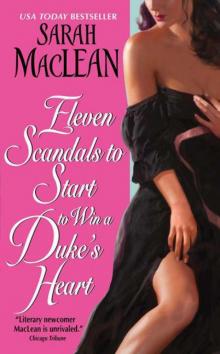 Eleven Scandals to Start to Win a Duke's Heart
Eleven Scandals to Start to Win a Duke's Heart Naughty Brits: An Anthology
Naughty Brits: An Anthology The Day of the Duchess
The Day of the Duchess Never Judge a Lady By Her Cover: Number 4 in series (The Rules of Scoundrels series)
Never Judge a Lady By Her Cover: Number 4 in series (The Rules of Scoundrels series)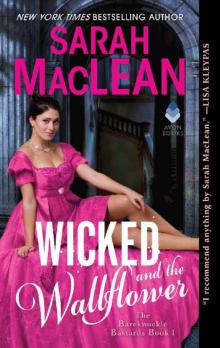 Wicked and the Wallflower: Bareknuckle Bastards Book 1
Wicked and the Wallflower: Bareknuckle Bastards Book 1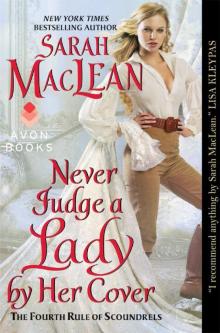 Never Judge a Lady by Her Cover_The Fourth Rule of Scoundrels
Never Judge a Lady by Her Cover_The Fourth Rule of Scoundrels